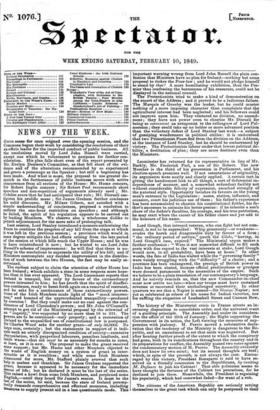Lord Gough, that intrepid veteran, who can fight but not
com- mand, is not to be superseded : Whig generosity—or weakness—. evades the harsh and disagreeable duty by favour of a form ; "the ordinary period of service," quoth the Globe, "having, in Lord Gough's case, expired." The Ministerial organ makes a further confession : " Were it not somewhat difficult to fill such posts with due regard to the vast interests at stake, Lord Gough would now, in all probability, have been at home." In other words, the fate of India has waited while the " governing family" were vainly struggling with the "difficulty" of a choice ; and a province has been endangered, the prestige of British power in India has been abated, because official predilections or grudges were deemed paramount to the necessities of the empire. Such we believe to be a plain translation of our contemporary's language. And he naïvely reminds us, that the new Commander-in-chief must now arrive too late—when our troops must have sustained reverses or recovered their unchallenged superiority. In other quarters we see that a Napier is named—Sir George Napier ; not yet so celebrated as others of his name for Indian victories, nor for ruffling the etiquettes of Leadenhall Street and Cannon Row.


























